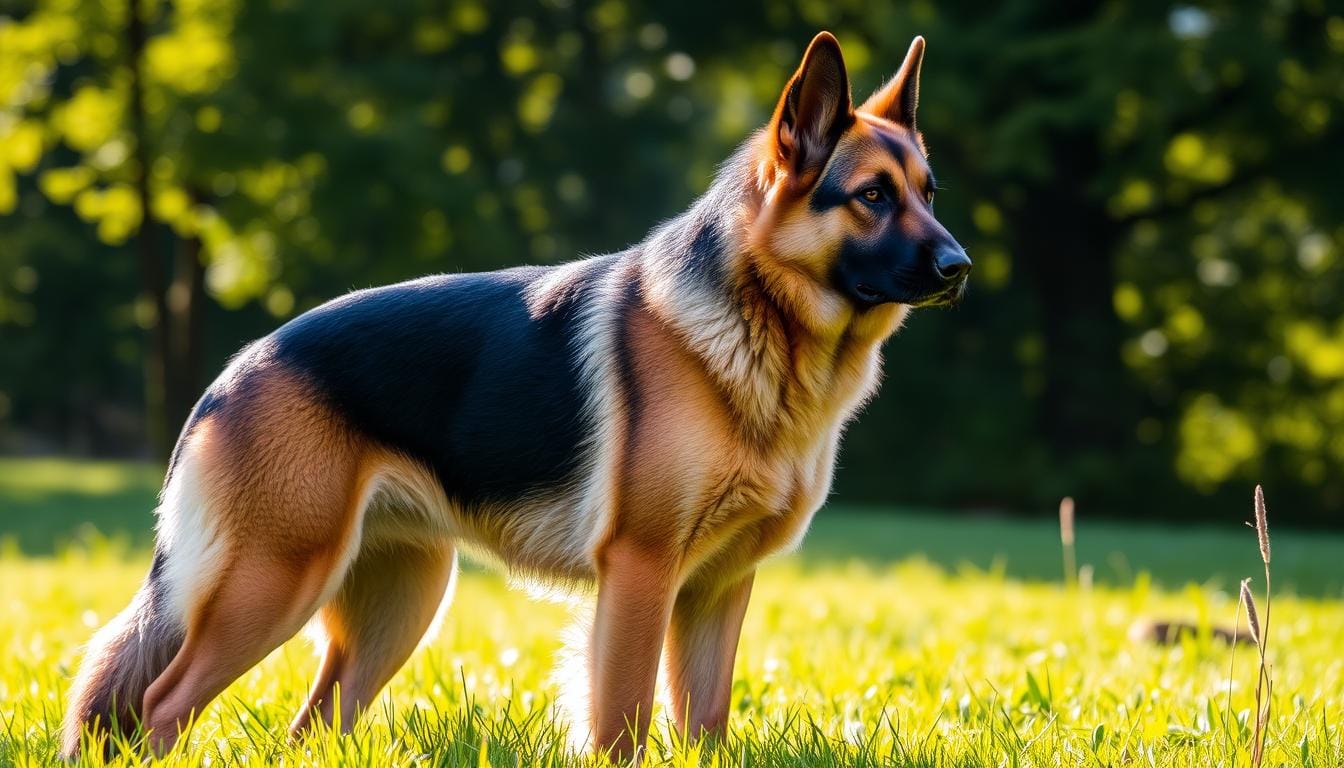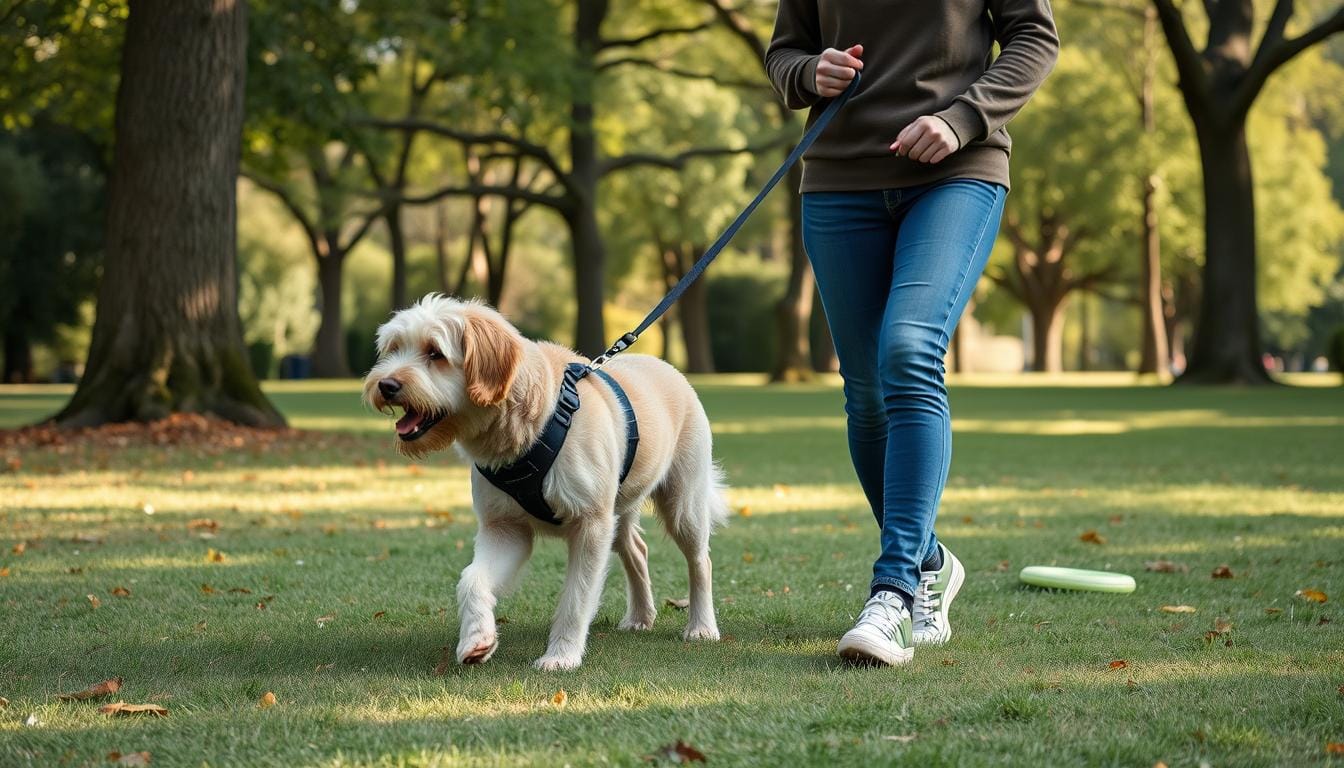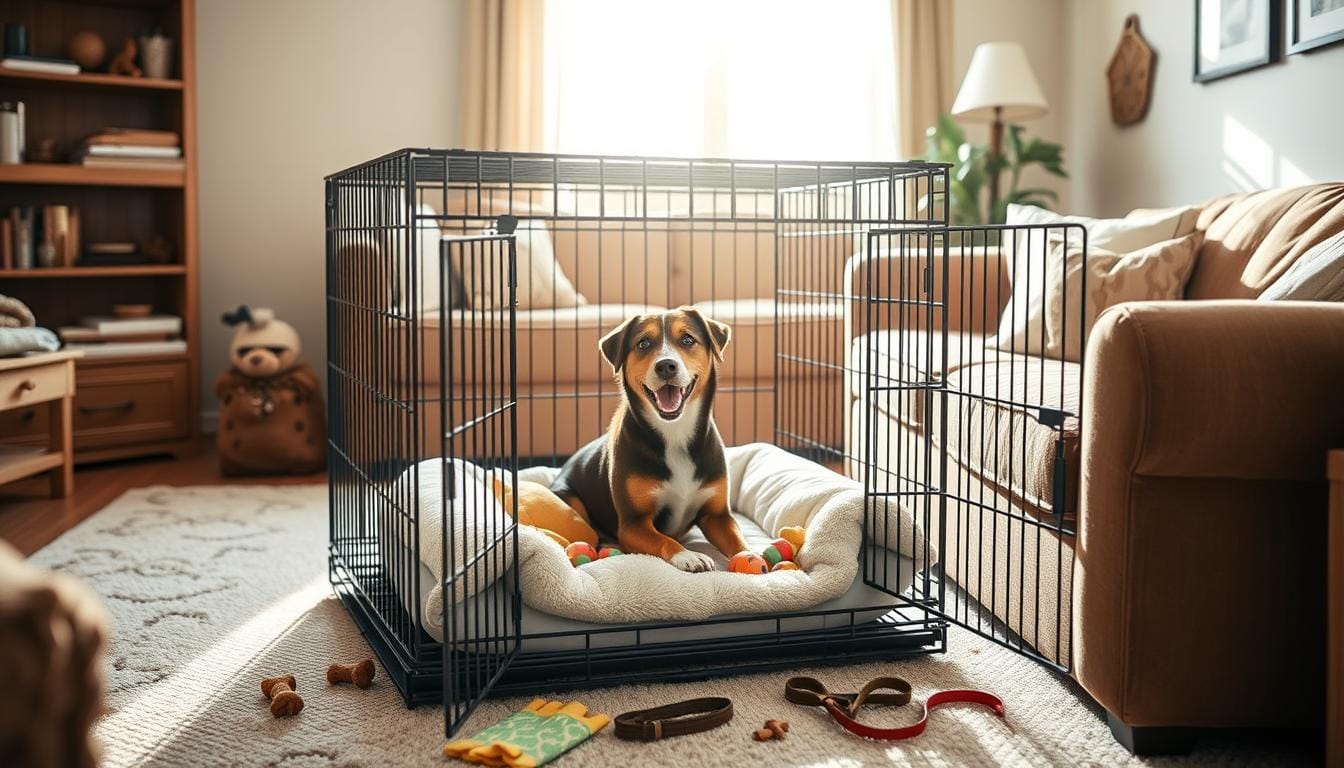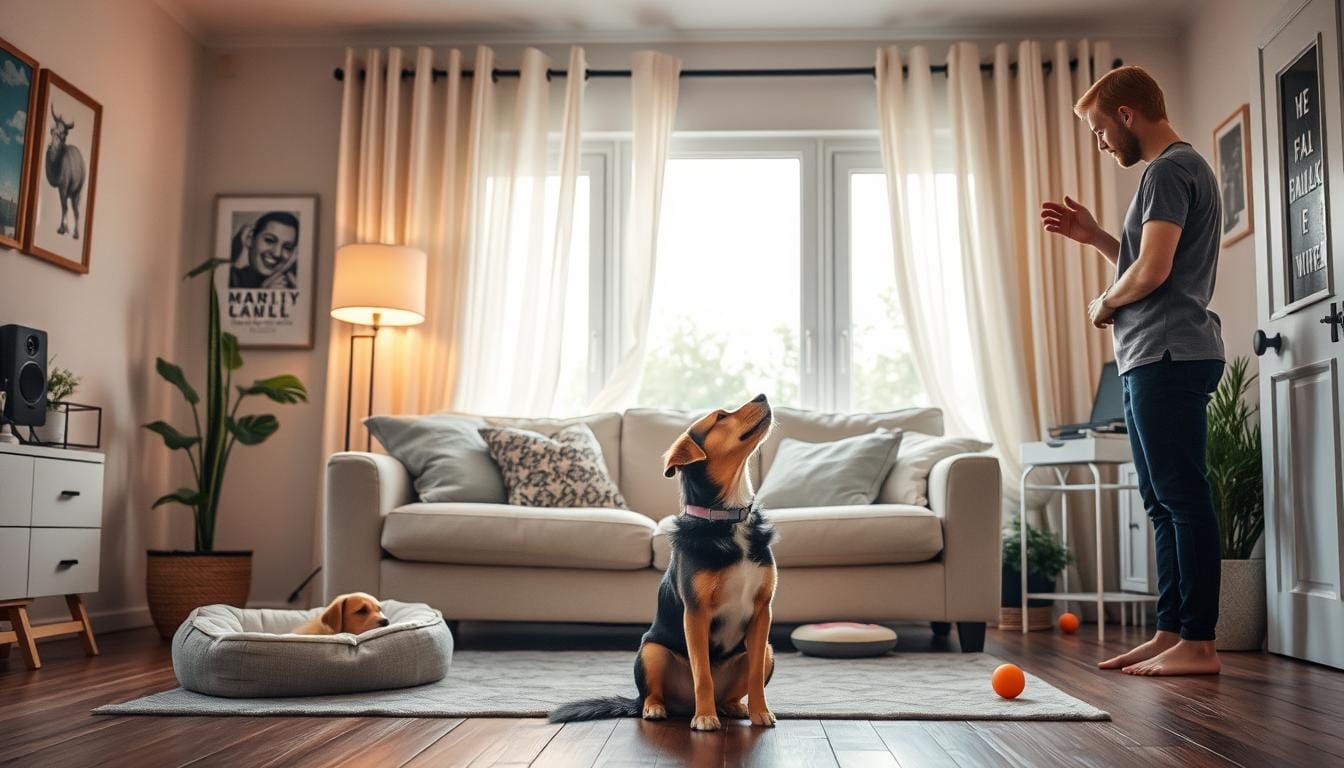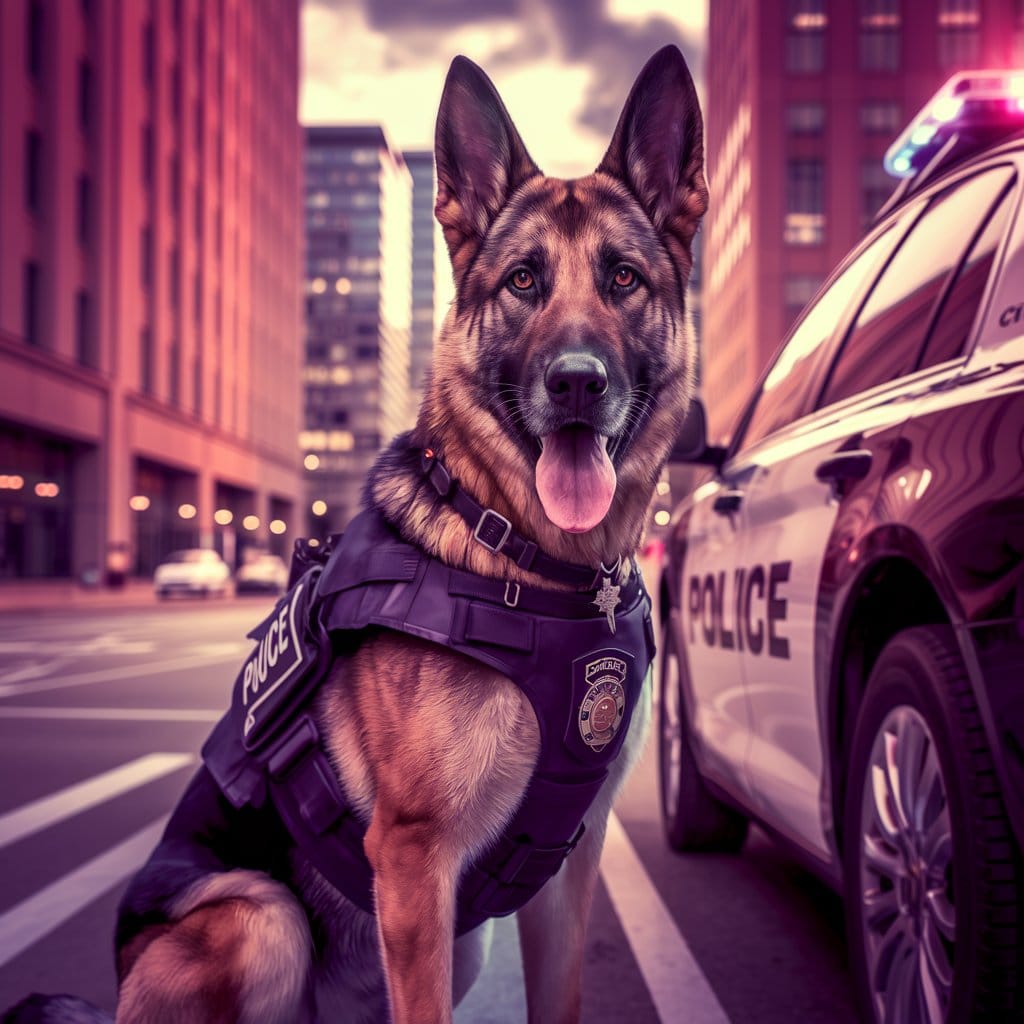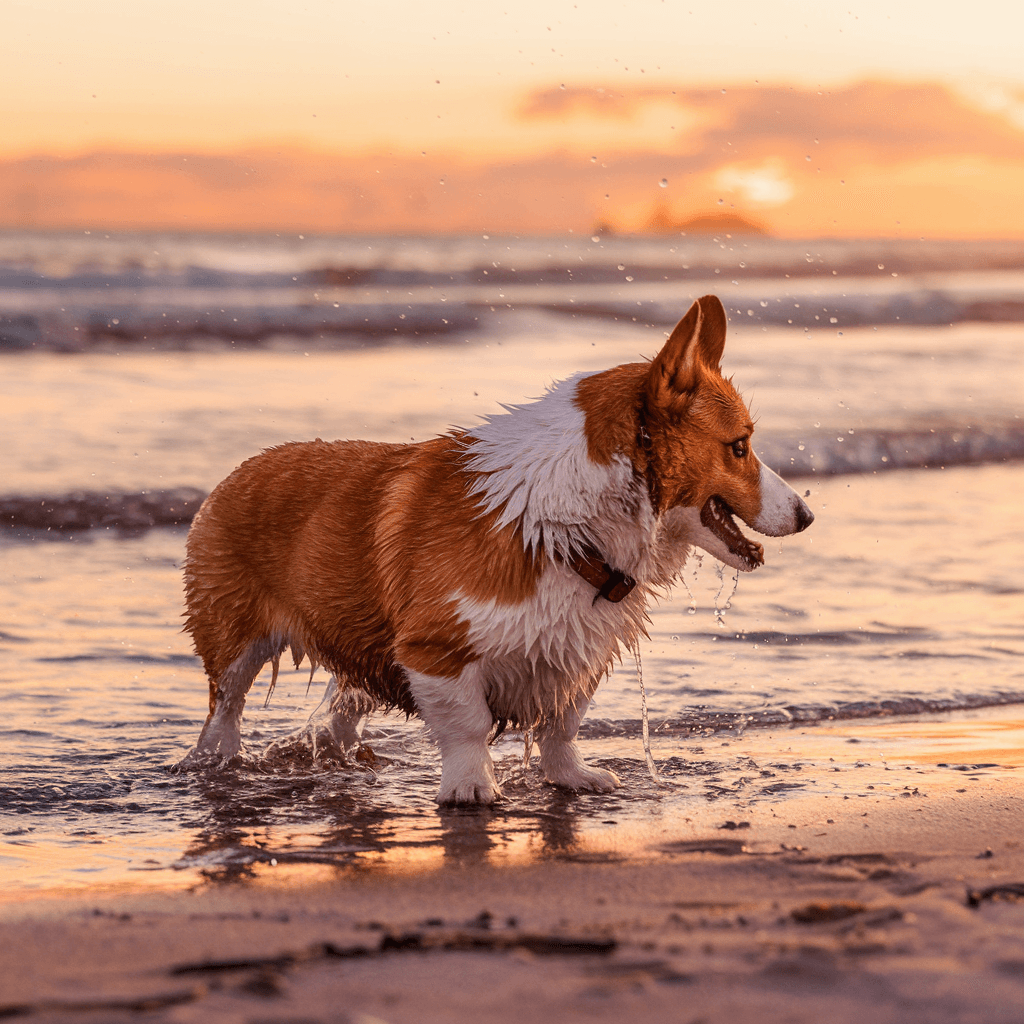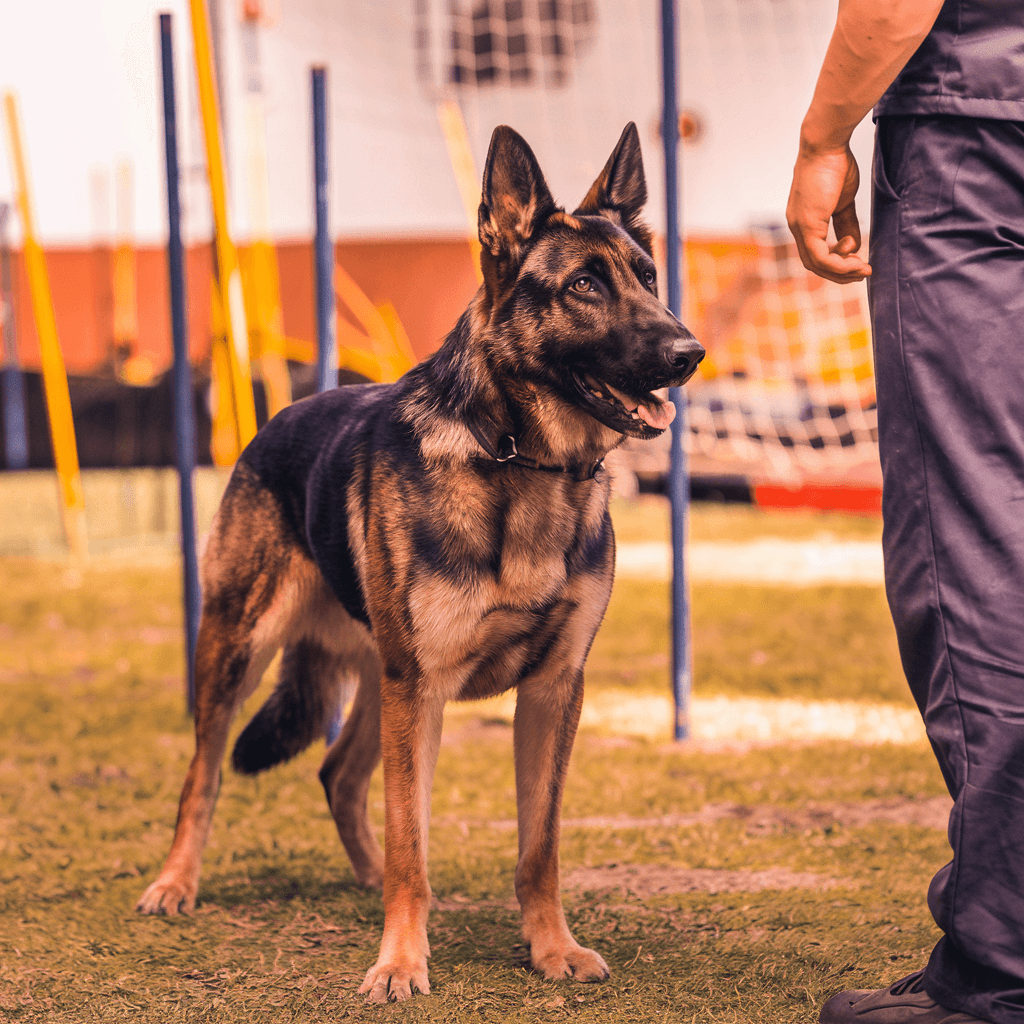What makes German Shepherds special among loyal dog breeds? These smart dogs win hearts with their loyalty and adaptability. Did you know they’re the second most popular breed in the U.S.? This shows how much people love them.
Let’s explore the German Shepherd world. We’ll look at their history and what makes them great companions. They’re perfect for families and work roles, making them a favorite choice.
Key Takeaways
- German Shepherds rank as the 2nd most registered breed in the U.S.
- They typically stand 22-26 inches tall and weigh 50-90 pounds.
- These dogs require 30-60 minutes of daily exercise.
- German Shepherds have a lifespan of 9-13 years on average.
- Regular grooming is essential to manage their dense double coat.
- Early socialization is crucial for preventing aggression issues.
- They excel in various roles, including family pets and working dogs.
The History and Origins of German Shepherds
The German Shepherd dog has a long and fascinating history. It all started in late 19th-century Germany.
Max von Stephanitz and the Breed’s Foundation
In April 1899, Captain Max von Stephanitz started the German Shepherd breed. He bought a dog named Horand von Grafrath for 200 German gold marks. This dog got the first German Shepherd Dog registration number, SZ1. Von Stephanitz also started the Verein für deutsche Schäferhunde, the first German Shepherd Dog club.
Evolution from Herding to Working Dog
German Shepherds were first used for herding. But they soon became versatile working dogs. Their smarts, strength, and ability to learn made them perfect for many jobs. Now, they are great at police work, military tasks, and search and rescue.
Rise to Popularity in the 20th Century
During World War I, German Shepherds became famous as war dogs. Even though they faced prejudice, their fame grew. By 1926, over 8,000 were registered in the UK. Their intelligence, ranked third among all breeds, made them very popular.
| Year | Milestone |
|---|---|
| 1899 | Breed foundation by Max von Stephanitz |
| 1919 | 54 German Shepherds registered in UK |
| 1926 | Over 8,000 registrations in UK |
| 2009 | Second most popular breed in the US |
Physical Characteristics of German Shepherds
German Shepherds are known for their impressive stature and distinctive appearance. These magnificent dogs boast a medium to large build. They have a robust frame that exudes strength and agility. The german shepherd size varies between males and females, with males typically standing taller and weighing more.

Let’s take a closer look at the physical traits that make German Shepherds stand out:
| Characteristic | Male | Female |
|---|---|---|
| Height | 24-26 inches (60-65 cm) | 22-24 inches (55-60 cm) |
| Weight | 75-95 pounds (34-43 kg) | 50-70 pounds (23-32 kg) |
German Shepherds are renowned for their versatile coat types. They possess a double coat consisting of a dense outer layer and a soft undercoat. The outer coat can vary in length, ranging from short to medium, with some dogs sporting longer coats. This combination provides excellent protection against various weather conditions.
Color variations in German Shepherds are diverse and striking. Common coat colors include black and tan, sable, and solid black. Rarer variations like white, Isabella blue, and liver-sable also exist, adding to the breed’s visual appeal.
German Shepherds are built for endurance and speed, capable of sprinting up to 30 miles per hour. Their physical prowess, combined with their intelligence, makes them excellent working dogs in various fields. This includes police work, search and rescue, and guide dog services.
German Shepherd Temperament and Personality Traits
German Shepherds are known for their great temperament and unique personality. They are among the top picks for families and work roles. Let’s look at what makes their temperament special.
Intelligence and Trainability
German Shepherds are very smart and learn fast. They are among the top 10 breeds for intelligence. Their desire to please makes them perfect for many roles, from family pets to working dogs.
Loyalty and Protective Nature
German Shepherds are very loyal. A big 63.7% of them show confident and loyal traits. Their protective nature makes them great guardians for families. Vets often recommend them as a loyal and protective pet.
Energy Levels and Exercise Needs
German Shepherds have lots of energy and a strong work drive. They need regular exercise and mental challenges. Without enough activity, they might get destructive. It’s important to keep them busy and happy.
| Trait | Description | Percentage |
|---|---|---|
| Temperament Test Pass Rate | Shows breed-required characteristics | 84% |
| Loyal Personality | Displays confident and loyal traits | 63.7% |
| Popularity Ranking | AKC registration statistics | 2nd |
Knowing these traits is key for potential owners. German Shepherds are smart, loyal, and full of energy. They’re perfect for active families or individuals who can give them lots of exercise and mental challenges. For more info on loyal dog breeds and their care, check out trusted resources. This will help you prepare for life with a German Shepherd.
Training and Socialization for German Shepherds
Training is key for German Shepherds to become well-behaved and confident. They are smart and need consistent work and mental challenges. Early socialization is also vital to shape their behavior and avoid problems.
Start obedience training early. Teach basic commands like sit, stay, and come. Short, 20-minute sessions keep their focus. Remember, German Shepherds grow up to two or three years old, so be patient.

Socialization should start between 8-12 weeks old. This helps them accept new things more easily. Take them to parks, schools, or community events. Always keep them on a leash to stay safe.
- Spend 5-10 minutes daily on socialization exercises
- Introduce your dog to friends and different walking spots
- Consider crate training to aid housetraining and reduce separation anxiety
Good socialization can stop aggression, which is a big problem for dogs. It also helps with their impulse control, like barking or chasing. With time in training and socialization, your German Shepherd will be well-adjusted and obedient.
Health Concerns and Care for German Shepherds
German Shepherds need special care because they can get sick easily. We’ll talk about common health problems, what they should eat, and how to keep their coat clean. This will help your dog stay healthy and happy.
Common Health Issues
German Shepherds often get hip and elbow problems. About 20% of them have these issues. They also can get a serious stomach problem called GDV. Taking them to the vet regularly can help find these problems early.
Nutrition and Diet Requirements
It’s important to feed German Shepherds the right food. Adult dogs need 20-25% protein and 10-15% fat. Puppies need even more protein and fat. Feed adult dogs twice a day, and puppies three to four times a day.
Grooming and Coat Maintenance
Keeping your German Shepherd’s coat clean is important. Brush them at least once a month. This keeps their coat healthy and lets you check for any skin problems.
| Aspect | Recommendation |
|---|---|
| Brushing Frequency | At least once a month |
| Diet Protein (Adult) | 20-25% |
| Diet Fat (Adult) | 10-15% |
| Feeding (Adult) | Twice daily |
By focusing on their health, diet, and grooming, you can make sure your German Shepherd lives a long, happy life. Don’t forget to take them to the vet regularly. This helps catch health problems early.
German Shepherds as Working Dogs
German Shepherds are known for being smart, loyal, and easy to train. They are great at many jobs because of these traits. Let’s look at the different ways they help us.
Police and Military Roles
German Shepherds are top-notch in law enforcement and the military. As police dogs, they find drugs, catch suspects, and keep crowds in order. Their smell and strength are key for police work. In the military, they help find explosives and search for people.
Search and Rescue Operations
German Shepherds are quick to respond in emergencies. They can go through tough places to find people. They help find survivors in buildings and track down missing people in the woods.
Service and Assistance Dogs
German Shepherds are also great as service and assistance dogs. They are smart and gentle, making them perfect for helping people with disabilities. They guide the blind, alert the deaf, and comfort those in need.
The American Kennel Club says German Shepherds are the second most popular breed in the U.S. They are good at many jobs, from police work to helping people. German Shepherds are truly amazing working dogs.
| Role | Key Skills | Daily Calorie Intake |
|---|---|---|
| Police/Military | Tracking, protection, drug/explosive detection | 1,900 – 2,100 |
| Search and Rescue | Scent detection, agility, endurance | 1,800 – 2,000 |
| Service/Assistance | Guidance, alertness, emotional support | 1,740 – 1,900 |
Working German Shepherds need more calories to keep up with their busy lives. Their diet must be balanced to keep them strong and focused on their jobs.
Living with a German Shepherd: Family Life and Compatibility
German Shepherds are great family pets if they’re well-trained and socialized. They bond strongly with their families and protect their homes. Their loyalty and desire to please make them perfect for family life.
German Shepherds usually get along with kids, but they need watching because of their size and energy. It’s important to socialize them early to get along with other pets and people. They do best in homes with yards where they can run and play.
“German Shepherds are highly loyal and protective of their family but require training to harness their guard dog skills.”
Thinking of getting a German Shepherd? Remember they need lots of exercise and can shed a lot. They need mental and physical challenges to stay happy and healthy. Owners often look for new activities to keep them busy.
| Aspect | Compatibility with Family Life |
|---|---|
| Children | Good with supervision |
| Other Pets | Requires early socialization |
| Space Needs | Large yard preferred |
| Exercise Requirements | High |
| Shedding | Heavy, twice yearly |
Living with a German Shepherd means accepting their protective side and lots of energy. They do well with structure and regular training. For families ready to put in the work, a German Shepherd can be a loving and loyal friend and protector.
German Shepherd Variations: Colors and Coat Types
German Shepherds come in a wide range of colors and coat types. This makes each dog truly unique. We’ll look at the standard and rare colors, as well as the different coat lengths.
Standard Colors and Patterns
The classic black and tan pattern is well-known. Another favorite is the red and black, with a black saddle and red accents. But sable is the most common, with hair that has multiple colors like brown, black, silver, and red.
Rare Color Variations
Solid black German Shepherds are less common because of a rare gene. White German Shepherds are rare too, and they’re not allowed in some shows. Bi-colored German Shepherds have black markings on their legs and a mostly black body with other colors.
Coat Length Differences
German Shepherds have two main coat types: the standard coat and the long stock coat. The standard coat can be short or medium. Short coats are best for working dogs and are under 1″. Medium coats are 1″ to 2″ long. Long coats are over 2″ and need more grooming.
| Coat Type | Length | Grooming Needs |
|---|---|---|
| Short Stock | 1″ or less | Low |
| Medium Stock | 1″ to 2″ | Moderate |
| Long Stock | 2″ or longer | High |
German Shepherds have a double coat, with a thick undercoat and a protective topcoat. They shed all year, but especially twice a year. Regular brushing and care are key to keeping their coat healthy and managing shedding.
Conclusion
The German Shepherd breed is truly remarkable as a canine companion. They have won the hearts of dog lovers everywhere with their smarts, versatility, and loyalty. From herding to law enforcement and family roles, they adapt well.
German Shepherds live 9-13 years, offering families a long time to bond. They are big, with males reaching 24-26 inches tall. Their intelligence is unmatched, often ranking them as one of the smartest dog breeds.
German Shepherds are great in many roles, like police work and search and rescue. They also make excellent family pets. They need regular brushing, especially when they shed. Owners must be ready for an active life, as these dogs love to exercise and learn.
With the right care, training, and love, a German Shepherd can be a loyal friend for many years.

